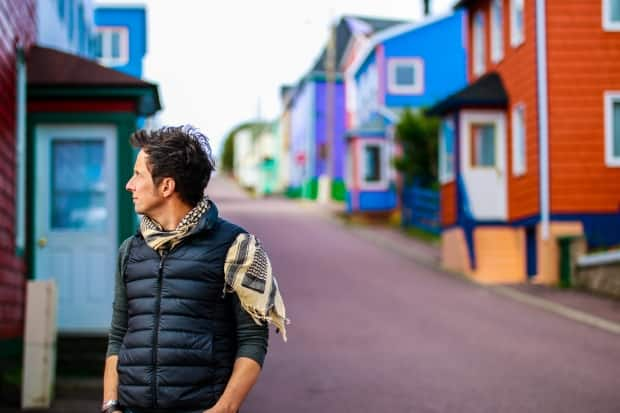Back to the road: Jonny Harris on why Still Standing has struck a pandemic chord


Jonny Harris, the host of CBC's Still Standing, knows what makes small town culture unique — after all, he grew up in Pouch Cove, a Newfoundland and Labrador community of about 2,000 residents.
On Still Standing, which is now filming its seventh season, Harris travels to small towns across the country to showcase what makes them resilient when the odds seem to be stacked against them.
"It's sort of vicarious travel through your TV set," said Harris in an interview on The St. John's Morning Show. "I think essentially the charm of the show is, you know, getting to show off some places that you've probably never heard of."
During its most recent season, Still Standing featured towns in eight provinces and territories, ranging from Lillooet, B.C., to Botwood, N.L.
During each episode, Harris interviews residents about the history and culture of the town, and learns about how the community has overcome challenges. Harris caps off his visit with a live comedy show, incorporating inside jokes about the town into his set.
When many were stuck at home due to COVID-19 lockdowns, Still Standing surged in popularity. Harris says that while unable to go anywhere, people enjoyed learning about different communities through a comedic lens.
"I think being able to highlight some of these places, this is something that people appreciate and appreciate learning a bit about," he said.
Harris said that an episode set in his hometown may be in the cards.
"Listen, they're going to crucify me in Pouch Cove if I don't come out there and do a show," he said. "I think next summer we'll definitely be there."
Harris said that he'd like to highlight the town's "gorgeous" landscape and dynamic visual art scene, as well as his own old hangout spots.
Harris said he remembers places with names like "the Judge's Chambers," where "a 14-year-old Jonny Harris and his buddies used to hide to smoke cigarettes."
WATCH | Revisit one of Still Standing's most popular episodes, shot on Bell Island, in Newfoundland's Conception Bay:
He also wants to return to the places where he would "bomb around" on off-road vehicles with friends.
"Just a few sort of inside stories might be fun," Harris said.
Comedy during COVID-19
Although the show made for perfect pandemic viewing, Harris said the logistics of filming the show under COVID-19 restrictions proved difficult.
To make sure that the live performances were safe and ventilated, the film crew used outdoor performance tents rather than indoor venues. During daytime dress rehearsals, the crew would cover the tent in black felt to mimic the darkness of an indoor theatre.
"People will maybe spy these episodes because of the few people in the audience wearing tuques, which is a first for Still Standing," Harris said.

The live shows are usually packed but capacity rules forced the production team to limit audiences to 25 people.
"I was like, 'Oh, this is going to look awful. It's not going to look like the community is there,'" Harris said.
His fears were eased when he saw an episode of The Tonight Show in which Jimmy Fallon performed for an empty theatre.
"I thought, 'OK, if he can sort of eat some dirt during this weird time, maybe I should, too,'" Harris said.
Harris is currently in Peterborough, Ont., shooting Season 15 of Murdoch Mysteries. Harris, 45, has portrayed police officer George Crabtree since the show's launch in 2008.
The new season of Still Standing has been delayed because of the pandemic, but Harris is hoping for a January premiere date.

